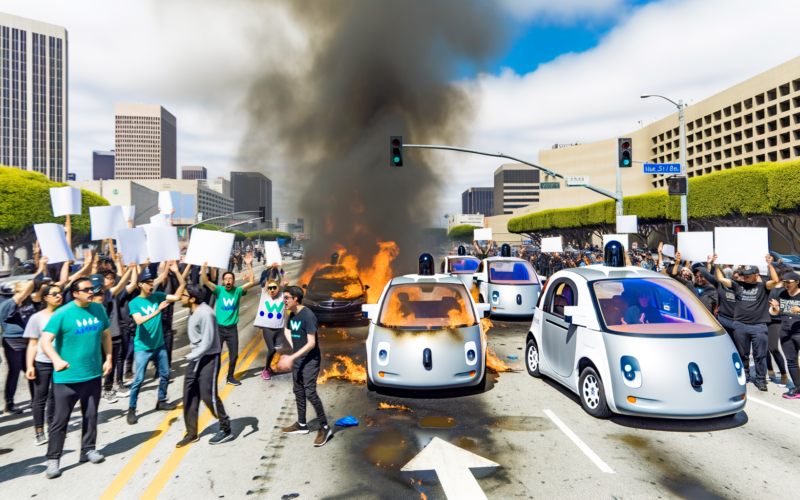Protesters set fire to Waymo’s self-driving cars in LA amid ICE protests, sparking toxic fumes. Waymo halts operations in the area. #Waymo #ICEProtests #LosAngeles
- Introduction
- The Historical Context of Self-Driving Technology
- Main Insights on Autonomous Vehicles and Social Dynamics
- Challenges and Opportunities in Autonomous Vehicle Deployment
- Future Outlook: Navigating the Road Ahead
- Final Reflections on Autonomous Vehicles and Society
Introduction
In a world increasingly driven by technological advancements, the incident involving Waymo’s self-driving cars during a protest in Los Angeles serves as a poignant reminder of the complex interplay between innovation and societal issues. Waymo, a pioneering company in autonomous vehicle technology, found its vehicles at the center of controversy when they were set ablaze amidst protests against U.S. Immigration and Customs Enforcement (ICE) activities. This episode not only highlights the vulnerability of cutting-edge technologies in volatile social climates but also raises critical questions about the roles and responsibilities of tech companies in politically charged environments. In this article, we will delve into the circumstances surrounding the incident, examine the broader implications for the tech industry, and explore how such events shape public perception and policy regarding autonomous vehicles.
The Historical Context of Self-Driving Technology
The journey of self-driving cars from concept to reality is marked by a series of technological breakthroughs and societal adaptations. Autonomous vehicles, once a futuristic vision, have gradually become an integral part of the transportation landscape. Companies like Waymo have been at the forefront, investing billions in research and development to perfect the technology. However, as these vehicles become more prevalent, they also become more entangled in societal issues. The Los Angeles incident is a stark reminder of how technological advancements can become flashpoints in societal debates, especially when intertwined with contentious issues like immigration enforcement.
The Role of Self-Driving Cars in Modern Society
Autonomous vehicles hold the promise of revolutionizing transportation by improving safety, reducing traffic congestion, and lowering emissions. However, their integration into society is not without challenges. The incident in Los Angeles underscores the potential for these vehicles to become symbolic targets in broader socio-political movements. As these cars become more visible on the streets, they also become more susceptible to being drawn into conflicts that have little to do with technology itself.
Public Perception and Policy Implications
Public perception of self-driving technology is crucial for its widespread adoption. Events like the vandalism of Waymo’s vehicles can significantly impact how the public views autonomous cars, potentially slowing down their acceptance. Moreover, such incidents can influence policy decisions, prompting governments to reconsider regulations surrounding autonomous vehicle deployment, especially in areas prone to civil unrest.
The Intersection of Technology and Activism
The destruction of Waymo’s cars during an ICE protest highlights a growing trend where technological symbols are used to express dissent. This intersection of technology and activism raises questions about the responsibilities of tech companies in politically sensitive situations. Should companies like Waymo anticipate and mitigate the risks of deploying their technologies in contentious environments? How can they balance innovation with social responsibility? These are questions that need addressing as technology continues to permeate every aspect of our lives.
Challenges and Opportunities in Autonomous Vehicle Deployment
Security and Vulnerability
The vulnerability of autonomous vehicles to vandalism and other forms of disruption is a significant challenge. Ensuring the security of these vehicles, both digital and physical, is paramount to their successful integration into society. This incident highlights the need for robust security protocols to protect these technologies from becoming casualties in societal conflicts.
Ethical and Legal Considerations
The legal and ethical implications of deploying self-driving cars in complex social landscapes are profound. Tech companies must navigate a myriad of legal frameworks and ethical considerations, particularly when their technologies intersect with contentious social issues. Developing comprehensive guidelines that address these challenges is essential for the responsible deployment of autonomous vehicles.
As we look to the future, it is clear that the road ahead for autonomous vehicles is fraught with both challenges and opportunities. The incident in Los Angeles serves as a catalyst for deeper reflection on the role of technology in society. Moving forward, tech companies, policymakers, and communities must collaborate to ensure that the integration of autonomous vehicles is both innovative and socially responsible. This involves addressing security vulnerabilities, shaping public perception through transparent communication, and crafting policies that reflect the complexities of modern society.
Final Reflections on Autonomous Vehicles and Society
The incident involving Waymo’s self-driving cars in Los Angeles is more than a story of vandalism; it is a microcosm of the broader challenges faced by emerging technologies in a rapidly changing world. It underscores the need for a balanced approach that embraces innovation while being mindful of societal implications. As we continue to push the boundaries of what is possible with technology, it is crucial to remain vigilant about its impact on society and to engage in ongoing dialogue about the ethical, legal, and social dimensions of technological advancement. Only then can we harness the full potential of innovations like autonomous vehicles to create a future that is both technologically advanced and socially equitable.











